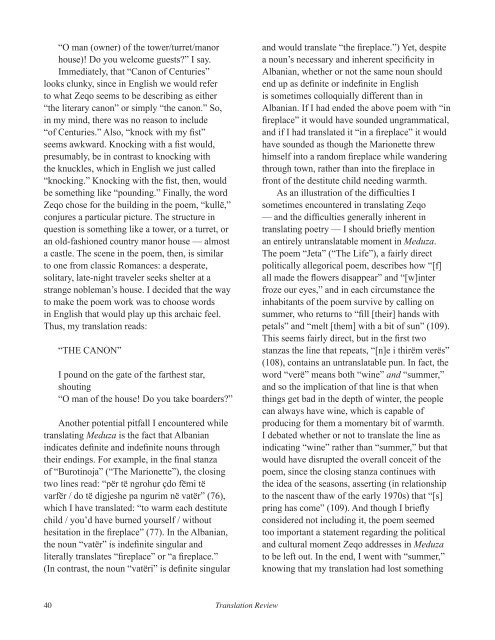Table of contents - The University of Texas at Dallas
Table of contents - The University of Texas at Dallas
Table of contents - The University of Texas at Dallas
Create successful ePaper yourself
Turn your PDF publications into a flip-book with our unique Google optimized e-Paper software.
“O man (owner) <strong>of</strong> the tower/turret/manor<br />
house)! Do you welcome guests” I say.<br />
Immedi<strong>at</strong>ely, th<strong>at</strong> “Canon <strong>of</strong> Centuries”<br />
looks clunky, since in English we would refer<br />
to wh<strong>at</strong> Zeqo seems to be describing as either<br />
“the literary canon” or simply “the canon.” So,<br />
in my mind, there was no reason to include<br />
“<strong>of</strong> Centuries.” Also, “knock with my fist”<br />
seems awkward. Knocking with a fist would,<br />
presumably, be in contrast to knocking with<br />
the knuckles, which in English we just called<br />
“knocking.” Knocking with the fist, then, would<br />
be something like “pounding.” Finally, the word<br />
Zeqo chose for the building in the poem, “kullë,”<br />
conjures a particular picture. <strong>The</strong> structure in<br />
question is something like a tower, or a turret, or<br />
an old-fashioned country manor house — almost<br />
a castle. <strong>The</strong> scene in the poem, then, is similar<br />
to one from classic Romances: a desper<strong>at</strong>e,<br />
solitary, l<strong>at</strong>e-night traveler seeks shelter <strong>at</strong> a<br />
strange nobleman’s house. I decided th<strong>at</strong> the way<br />
to make the poem work was to choose words<br />
in English th<strong>at</strong> would play up this archaic feel.<br />
Thus, my transl<strong>at</strong>ion reads:<br />
“THE CANON”<br />
I pound on the g<strong>at</strong>e <strong>of</strong> the farthest star,<br />
shouting<br />
“O man <strong>of</strong> the house! Do you take boarders”<br />
Another potential pitfall I encountered while<br />
transl<strong>at</strong>ing Meduza is the fact th<strong>at</strong> Albanian<br />
indic<strong>at</strong>es definite and indefinite nouns through<br />
their endings. For example, in the final stanza<br />
<strong>of</strong> “Burotinoja” (“<strong>The</strong> Marionette”), the closing<br />
two lines read: “për të ngrohur çdo fëmi të<br />
varfër / do të digjeshe pa ngurim në v<strong>at</strong>ër” (76),<br />
which I have transl<strong>at</strong>ed: “to warm each destitute<br />
child / you’d have burned yourself / without<br />
hesit<strong>at</strong>ion in the fireplace” (77). In the Albanian,<br />
the noun “v<strong>at</strong>ër” is indefinite singular and<br />
literally transl<strong>at</strong>es “fireplace” or “a fireplace.”<br />
(In contrast, the noun “v<strong>at</strong>ëri” is definite singular<br />
and would transl<strong>at</strong>e “the fireplace.”) Yet, despite<br />
a noun’s necessary and inherent specificity in<br />
Albanian, whether or not the same noun should<br />
end up as definite or indefinite in English<br />
is sometimes colloquially different than in<br />
Albanian. If I had ended the above poem with “in<br />
fireplace” it would have sounded ungramm<strong>at</strong>ical,<br />
and if I had transl<strong>at</strong>ed it “in a fireplace” it would<br />
have sounded as though the Marionette threw<br />
himself into a random fireplace while wandering<br />
through town, r<strong>at</strong>her than into the fireplace in<br />
front <strong>of</strong> the destitute child needing warmth.<br />
As an illustr<strong>at</strong>ion <strong>of</strong> the difficulties I<br />
sometimes encountered in transl<strong>at</strong>ing Zeqo<br />
— and the difficulties generally inherent in<br />
transl<strong>at</strong>ing poetry — I should briefly mention<br />
an entirely untransl<strong>at</strong>able moment in Meduza.<br />
<strong>The</strong> poem “Jeta” (“<strong>The</strong> Life”), a fairly direct<br />
politically allegorical poem, describes how “[f]<br />
all made the flowers disappear” and “[w]inter<br />
froze our eyes,” and in each circumstance the<br />
inhabitants <strong>of</strong> the poem survive by calling on<br />
summer, who returns to “fill [their] hands with<br />
petals” and “melt [them] with a bit <strong>of</strong> sun” (109).<br />
This seems fairly direct, but in the first two<br />
stanzas the line th<strong>at</strong> repe<strong>at</strong>s, “[n]e i thirëm verës”<br />
(108), contains an untransl<strong>at</strong>able pun. In fact, the<br />
word “verë” means both “wine” and “summer,”<br />
and so the implic<strong>at</strong>ion <strong>of</strong> th<strong>at</strong> line is th<strong>at</strong> when<br />
things get bad in the depth <strong>of</strong> winter, the people<br />
can always have wine, which is capable <strong>of</strong><br />
producing for them a momentary bit <strong>of</strong> warmth.<br />
I deb<strong>at</strong>ed whether or not to transl<strong>at</strong>e the line as<br />
indic<strong>at</strong>ing “wine” r<strong>at</strong>her than “summer,” but th<strong>at</strong><br />
would have disrupted the overall conceit <strong>of</strong> the<br />
poem, since the closing stanza continues with<br />
the idea <strong>of</strong> the seasons, asserting (in rel<strong>at</strong>ionship<br />
to the nascent thaw <strong>of</strong> the early 1970s) th<strong>at</strong> “[s]<br />
pring has come” (109). And though I briefly<br />
considered not including it, the poem seemed<br />
too important a st<strong>at</strong>ement regarding the political<br />
and cultural moment Zeqo addresses in Meduza<br />
to be left out. In the end, I went with “summer,”<br />
knowing th<strong>at</strong> my transl<strong>at</strong>ion had lost something<br />
40 Transl<strong>at</strong>ion Review

















